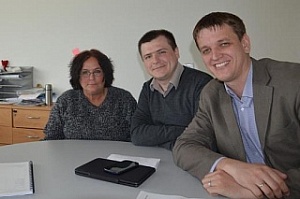TSU anthropologists are studying the professional identity of teachers from different countries within megagrant of the Russian Government on the project "A Man in the Changing World". According to their conclusions, «University 3.0» unites the Russian and British professors: the transformation of high schools leads to the fact that teachers pay more attention to the development of financial and management skills.
Alexander Sorokin and Mikhail Gribovsky, senior researchers at the Laboratory for Social and Anthropological Research (LSAR) conducted and analyzed more than 20 in-depth interviews with teachers of the leading group of universities included in the top 100 of the world ranking - the Universities of Birmingham, Leeds, Manchester, Sheffield, Gloucestershire, and Central Lancashire. Previously, they interviewed more than 50 professors from Moscow and the Siberian universities.
According to the conclusions of the anthropologists, both Professors in Russia and in the UK recognize the importance of soft skills (skills in project management, financial planning, and team building) and the need to acquire management skills.
- Thus the transformation processes in higher education taking place in countries at different stages and with different speeds lead to the formation of one type of the University - innovation and entrepreneurship ("University 3.0") and introducing entrepreneurial paradigm of the professional work, - said Alexander Sorokin.
According to the conclusions of the researchers, the basic elements of the identity of British teachers is a predominance in the team more working and less friendly relations. It is connected with the high level of competition and academic mobility and as a result, professors in the UK often change their place of work.
The teachers from Britain consider the benefits of their work academic freedom, flexibility of graphics, extensive communication capabilities, and a high degree of self-satisfaction from work.
- At the same time, our respondents drew attention to a reduction in the prestige of the profession in recent decades. Among the reasons are the quantitative growth of the teaching community, the bureaucracy, constantly increasing requirements to a teacher, and irregular work schedule, - says Mikhail Gribovsky.
The study was carried with the support of Centre for Russian, European and Eurasian Studies (CREES), University of Birmingham. In 2017, TSU anthropologists will expand the geography of the study of teachers’ professional identity and will include in the study universities in Germany, France, and Eastern Europe.

